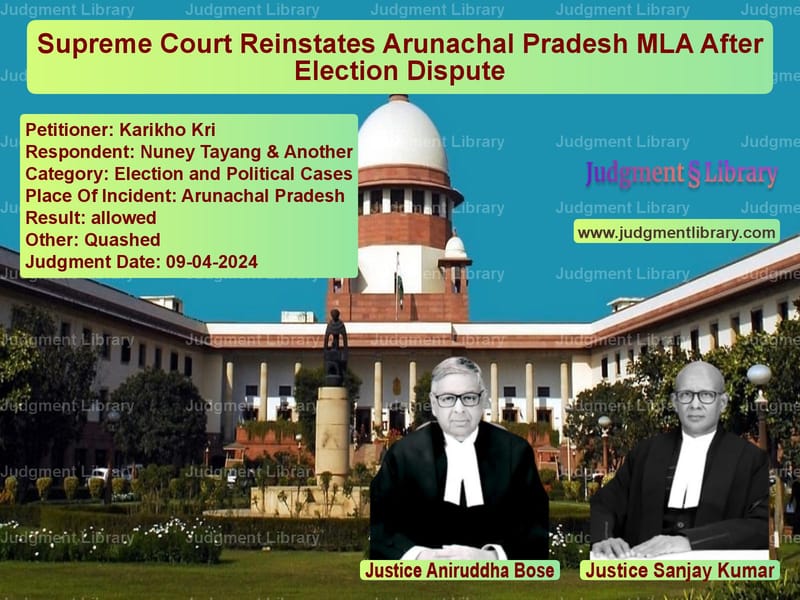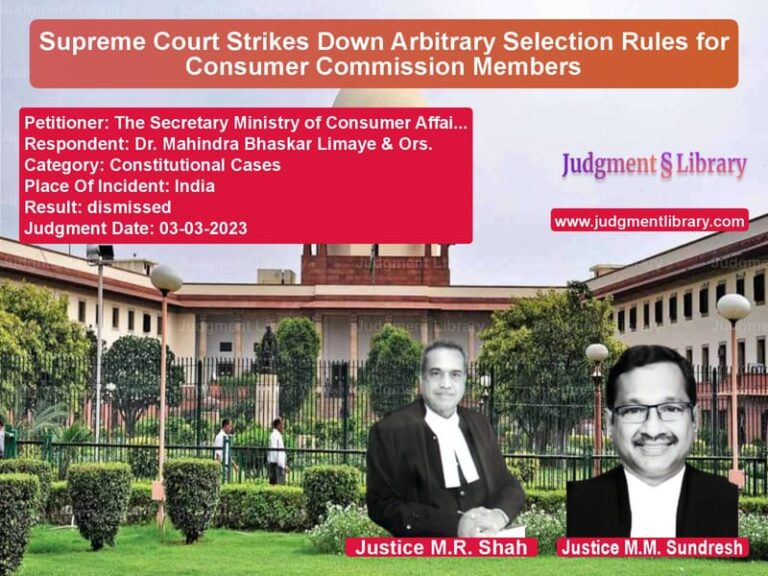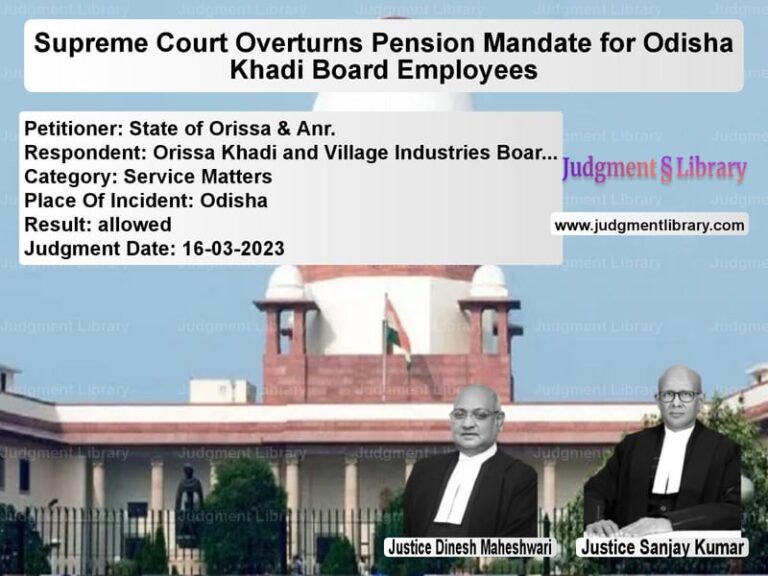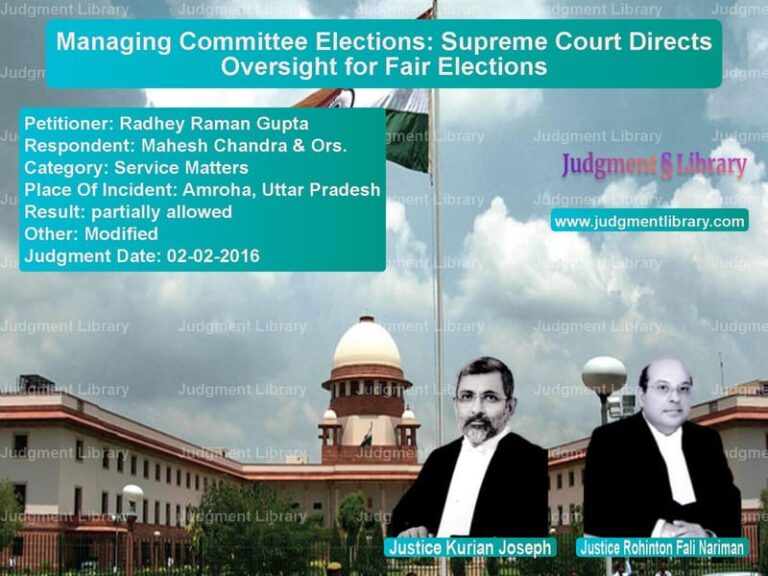Supreme Court Reinstates Arunachal Pradesh MLA After Election Dispute
The case of Karikho Kri vs. Nuney Tayang & Another revolves around an electoral dispute concerning the 44 Tezu (ST) Assembly Constituency in Arunachal Pradesh. The Supreme Court had to decide whether the election of Karikho Kri, an independent candidate, should be invalidated due to alleged non-disclosures in his nomination form. The Court ultimately upheld his election, setting aside the judgment of the Itanagar Bench of the High Court of Assam, Nagaland, Mizoram, and Arunachal Pradesh.
Background of the Case
In the 2019 Arunachal Pradesh Legislative Assembly elections, three candidates contested from the 44 Tezu (ST) constituency:
- Karikho Kri (Independent) – 7,538 votes (Winner)
- Dr. Mohesh Chai (BJP) – 7,383 votes
- Nuney Tayang (Congress) – 1,088 votes
After the election results were declared, Nuney Tayang filed Election Petition No. 01(AP) of 2019, seeking to have Karikho Kri’s election declared void. He alleged that Kri had failed to disclose several key details in his nomination affidavit, thereby violating Sections 100(1)(b), 100(1)(d)(i), and 100(1)(d)(iv) of the Representation of the People Act, 1951.
The Itanagar Bench of the High Court ruled against Karikho Kri, declaring his election void but rejecting Nuney Tayang’s plea to be declared the winner. Both Kri and Tayang appealed to the Supreme Court.
Key Legal Issues
- Did Karikho Kri’s non-disclosures in his nomination form amount to an improper acceptance of his nomination?
- Did the non-disclosures constitute a corrupt practice under Section 123(2) of the Representation of the People Act, 1951?
- Was the election materially affected by the alleged non-disclosures?
Arguments by the Appellant (Karikho Kri)
Kri challenged the High Court’s findings, arguing:
“The non-disclosures were not of substantial character, and the nomination was properly accepted by the Returning Officer after due scrutiny.”
He further argued that the alleged omissions did not materially affect the election’s outcome and did not amount to corrupt practices.
Arguments by the Respondents
Nuney Tayang contended:
“The failure to disclose vehicles owned by his family members and non-submission of a ‘No Dues Certificate’ regarding government accommodation amounted to misleading voters.”
He maintained that such omissions were substantial enough to warrant the election’s annulment.
Supreme Court’s Analysis
1. Non-Disclosure of Vehicles
The High Court had ruled that Kri failed to disclose three vehicles registered under his wife’s and son’s names. However, the Supreme Court noted:
“Though these vehicles were still registered under their names, evidence showed they had been sold or gifted long before the election.”
The Court emphasized that ownership, as per the Motor Vehicles Act, is a legal formality and does not necessarily indicate possession.
2. ‘No Dues Certificate’ for Government Accommodation
Kri had occupied MLA Cottage No.1 in Itanagar from 2009 to 2014 but did not submit a ‘No Dues Certificate’ with his nomination. The Court held:
“Failure to disclose past occupancy does not amount to a defect of substantial character when no dues were outstanding.”
Since Kri had cleared all dues and obtained a ‘No Dues Certificate’ in 2014, the omission was deemed immaterial.
3. Corrupt Practice Under Section 123(2)
The High Court had ruled that Kri’s omissions constituted ‘undue influence’ under Section 123(2). The Supreme Court disagreed, stating:
“Merely omitting minor details does not equate to corrupt practice unless it was intended to deceive voters.”
The Court emphasized that his declared assets exceeded ₹8.41 crores, making the non-disclosed items insignificant.
4. Material Effect on the Election
The Supreme Court ruled that for an election to be set aside under Section 100(1)(d), it must be shown that the irregularities ‘materially affected’ the election’s outcome. The Court found:
“Given the wide margin between Kri and Tayang, there is no evidence to suggest that the omissions affected voter decisions.”
Final Judgment
The Supreme Court overturned the High Court’s ruling, reinstating Karikho Kri’s election:
“The alleged omissions were not of substantial nature, and there was no corrupt practice. The election of the appellant is upheld.”
As a result, Tayang’s appeal was dismissed.
Key Takeaways from the Judgment
- Not all non-disclosures in a nomination form automatically invalidate an election.
- A corrupt practice requires intent to mislead voters, which was not present in this case.
- The burden of proof lies on the petitioner to show that an election was materially affected.
- Legal ownership of a vehicle does not necessarily imply current possession.
- The Returning Officer’s decision during scrutiny holds significant weight.
Judgment Date: April 9, 2024
Judges: Aniruddha Bose, Sanjay Kumar
Petitioner Name: Karikho Kri.Respondent Name: Nuney Tayang & Another.Judgment By: Justice Aniruddha Bose, Justice Sanjay Kumar.Place Of Incident: Arunachal Pradesh.Judgment Date: 09-04-2024.
Don’t miss out on the full details! Download the complete judgment in PDF format below and gain valuable insights instantly!
Download Judgment: karikho-kri-vs-nuney-tayang-&-anoth-supreme-court-of-india-judgment-dated-09-04-2024.pdf
Directly Download Judgment: Directly download this Judgment
See all petitions in Public Interest Litigation
See all petitions in Legislative Powers
See all petitions in Judgment by Aniruddha Bose
See all petitions in Judgment by Sanjay Kumar
See all petitions in allowed
See all petitions in Quashed
See all petitions in supreme court of India judgments April 2024
See all petitions in 2024 judgments
See all posts in Election and Political Cases Category
See all allowed petitions in Election and Political Cases Category
See all Dismissed petitions in Election and Political Cases Category
See all partially allowed petitions in Election and Political Cases Category







